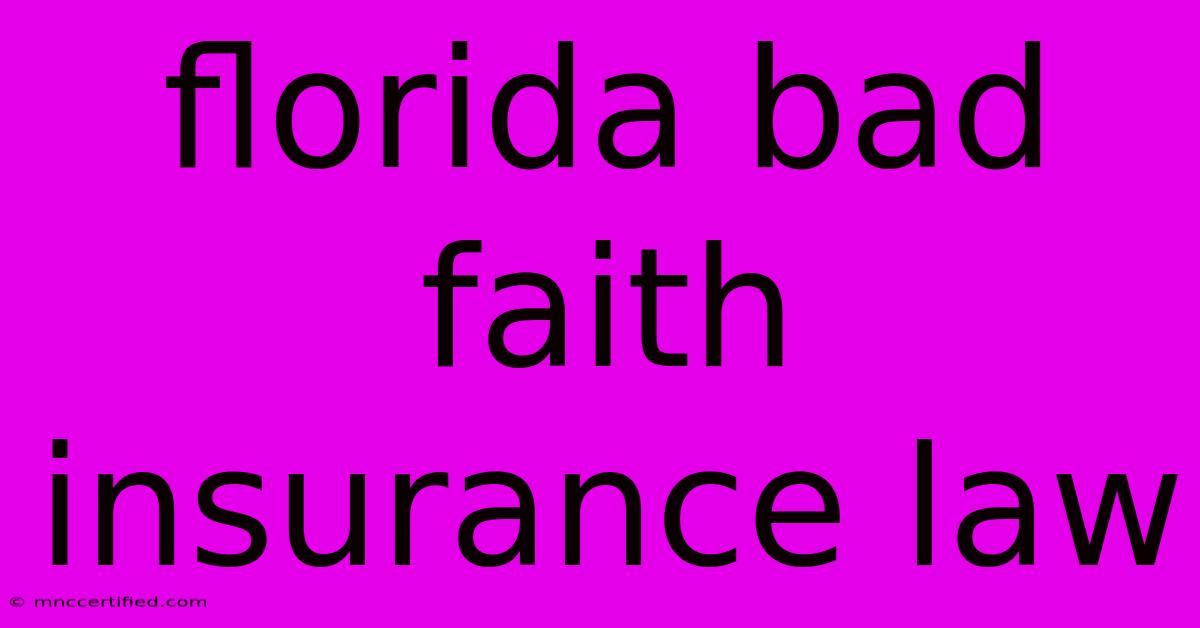Florida Bad Faith Insurance Law

Table of Contents
Navigating the Complexities of Florida Bad Faith Insurance Law
Florida's insurance landscape is notoriously complex, particularly when it comes to bad faith claims. Understanding your rights and the intricacies of Florida's bad faith insurance law is crucial if your insurance company fails to uphold its contractual obligations. This comprehensive guide will illuminate key aspects of Florida bad faith law, helping you navigate this challenging legal terrain.
What Constitutes Bad Faith in Florida Insurance Law?
In Florida, bad faith is defined as an insurance company's unreasonable and unfounded refusal to settle a claim or to adequately investigate a claim. This isn't simply a matter of a delayed payment or a denied claim; it involves a pattern of conduct demonstrating a conscious disregard for the policyholder's rights. Key elements often involved in proving bad faith include:
- Failure to Investigate: The insurer must conduct a reasonable investigation into the facts of the claim. Failing to gather sufficient evidence, neglecting witness statements, or ignoring pertinent medical records can constitute bad faith.
- Unreasonable Delay in Payment: While processing times vary, unreasonable delays without valid justification, particularly when the insurer has already determined liability, can support a bad faith claim.
- Unreasonable Denial of Coverage: Denying coverage based on flimsy evidence or misinterpretations of the policy language is often grounds for a bad faith claim. This is especially true if the insurer fails to properly apply relevant case law.
- Failure to Settle Within Policy Limits: When an insurer refuses to settle a claim within its policy limits despite a clear indication of liability exceeding those limits, and a judgment subsequently exceeds those limits, it can be considered bad faith. This exposes the policyholder to potentially devastating financial consequences.
- Unfair Claim Practices: Florida law prohibits specific unfair claim settlement practices, including misrepresentation, concealment, and making false promises.
Proving Bad Faith: The Burden of Proof
Proving bad faith in Florida requires demonstrating that the insurer acted unreasonably and without a proper basis. This is often a challenging task, requiring meticulous documentation and expert legal counsel. You'll need to prove:
- The existence of a valid insurance policy.
- A breach of contract by the insurer.
- The insurer acted in bad faith. This often involves showing a pattern of conduct rather than a single isolated incident.
- Damages suffered as a direct result of the insurer's bad faith conduct.
Damages Recoverable in Bad Faith Cases
If successful in a bad faith claim, a policyholder can recover various damages, including:
- Compensatory damages: These cover losses directly caused by the insurer's bad faith actions, such as medical bills, lost wages, and property damage.
- Punitive damages: These are awarded to punish the insurer for egregious misconduct and deter similar behavior in the future. Punitive damages are only awarded in cases where the insurer's conduct is particularly egregious.
- Attorney's fees and costs: Florida law often allows the recovery of attorney's fees and court costs incurred in pursuing the bad faith claim.
Seeking Legal Representation
Navigating Florida's bad faith insurance laws can be complex and challenging. It's highly recommended to consult with an experienced Florida insurance bad faith attorney. They can assess the strength of your claim, gather necessary evidence, and represent you in negotiations and litigation.
Keywords for SEO Optimization
This article incorporates relevant keywords throughout, including: Florida bad faith insurance law, Florida insurance bad faith, bad faith insurance claim Florida, insurance bad faith attorney Florida, proving bad faith in Florida, Florida bad faith insurance damages, unreasonable denial of coverage Florida, failure to investigate insurance claim Florida, unreasonable delay in payment Florida, punitive damages Florida insurance, and compensatory damages Florida insurance. These keywords are naturally integrated to avoid keyword stuffing while ensuring strong search engine optimization.
Off-Page SEO Strategies
To further enhance this article's visibility, consider the following off-page SEO strategies:
- Guest blogging: Contribute articles related to Florida insurance law to relevant blogs and websites.
- Social media marketing: Share the article on social media platforms, engaging with relevant groups and communities.
- Link building: Secure high-quality backlinks from reputable websites in the legal and insurance industries.
- Local SEO: Optimize the article for local searches within Florida, targeting specific cities or regions.
By implementing these on-page and off-page SEO strategies, this article is designed to attract a wide audience seeking information on Florida's complex bad faith insurance laws and achieve high rankings in search engine results. Remember, this is for informational purposes only and does not constitute legal advice. Always consult with a qualified legal professional for guidance on your specific situation.

Thank you for visiting our website wich cover about Florida Bad Faith Insurance Law. We hope the information provided has been useful to you. Feel free to contact us if you have any questions or need further assistance. See you next time and dont miss to bookmark.
Featured Posts
-
Estrella Insurance Las Vegas Nv
Nov 26, 2024
-
National Specialty Insurance Nj
Nov 26, 2024
-
Black Friday Steam Deck Discounts Extended
Nov 26, 2024
-
Everest Security Auto Insurance
Nov 26, 2024
-
Barbara Taylor Bradfords Inspiring Journey
Nov 26, 2024